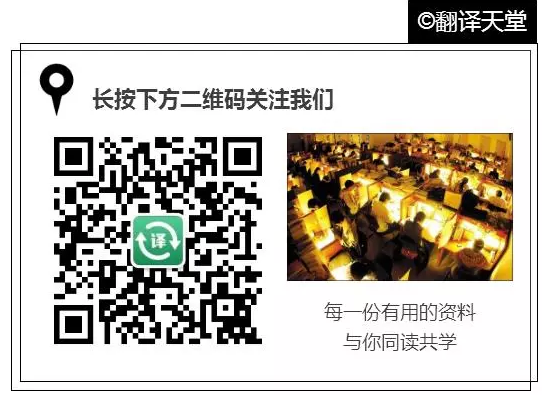为方便大家随时阅读学习,翻译天堂现分段推出政府白皮书中英对照版。每天看点白皮书,每天进步一点点。
——天堂君
四、中国积极推动更高水平对外开放
IV. China Is Actively Advancing Opening-Up to a Higher Level
中国的对外开放不会止步于履行加入世贸组织承诺。面对汹涌澎湃但又充满曲折的经济全球化,中国顺应时代发展潮流和世界发展大势,坚定不移扩大对外开放,不断创造更全面、更深入、更多元的对外开放格局,实现更广泛的互利共赢。
Fulfilling China’s WTO commitments has never been the end point of its opening-up. In the face of the overwhelming trend of economic globalization and its winding path, China keeps pace with the times, takes firm steps to expand opening-up, and makes continuous efforts to open up in a more comprehensive, profound and diversified way, with a view to achieving greater mutual benefit and win-win outcomes.
(一)促进贸易平衡发展
1. Promoting balanced development of trade
中国的贸易战略宗旨是互利共赢、多元平衡。中国注重提升出口质量和附加值,积极扩大进口,更好融入全球价值链。中国不刻意追求货物贸易顺差,客观看待目前服务贸易存在的逆差,支持有利于丰富市场供给、有利于提升人民生活品质、有利于促进产业结构升级的进口。
China pursues a trade strategy of mutual benefit, win-win, diversification and balanced development. It endeavors to raise the quality and added-value of its exports, proactively increase imports, and better integrate into the global value chains. China never deliberately pursues trade surplus in goods. At the same time, China takes an objective view towards existing trade deficit in services. The country always welcomes imports that diversify market supply, improve people’s quality of life, and upgrade its industrial structure.
在全面履行加入承诺的基础上,中国近年来又多次以暂定税率方式大幅自主降低进口关税税率。根据世贸组织统计,2015年中国的贸易加权平均关税已降至4.4%,与美国、欧盟等发达经济体相差1.5-2个百分点。截至2017年底,已调减900多个税目产品的税率。在博鳌亚洲论坛2018年年会上,中国宣布将进一步扩大降税范围,努力增加人民群众需求比较集中的特色优势产品进口。
In recent years, on top of its commitments to the WTO, China has self-initiated significant reductions to import tariffs on an interim basis for multiple times. According to the WTO, China’s trade-weighted average import tariff rate had fallen to 4.4 percent in 2015, only 1.5 to 2 percentage points higher than those of developed economies such as the US and the EU. By the end of 2017, China had reduced tariffs on more than 900 tariff lines. At the 2018 Boao Forum for Asia Annual Conference, China announced plans to further reduce import tariffs and to import more high-quality, distinctive products that meet the strong demand of the Chinese people.
(二)提高贸易便利化水平
2. Facilitating international trade
世贸组织《贸易便利化协定》实施一年多以来,中国贸易便利化水平显著提升。目前,中国海关进口货物平均通关时间缩短至20小时以内,出口货物平均通关时间不到2小时。
China’s efforts to implement the WTO Trade Facilitation Agreement, which entered into force in February 2017, have resulted in impressive improvement in China’s trade facilitation. The average time for customs clearance has been reduced to less than 20 hours for imports and less than two hours for exports.
中国加快推进国际贸易“单一窗口”建设和推广。截至2017年底,中国国际贸易“单一窗口”已与11个口岸管理相关部门对接,基本覆盖大通关主要流程,实现企业一点接入、一次提交、一次查验、一键跟踪、一站办理,加速了口岸治理体系现代化建设进程。
China has accelerated the establishment of a single window for international trade. By the end of 2017, the China International Trade Single Window had been connected to 11 authorities and agencies responsible for border control and covered basically all major import and export procedures. This one-stop system enables traders to use a single entry point to declare freight and taxes with a single submission of documents, and track the results after a single joint inspection by the participating authorities. It has accelerated the modernization of China’s port management.
中国将继续优化监管方式方法,改革口岸管理体制,进一步压缩进出口环节和成本,不断优化口岸营商环境。
China will further optimize supervision and management approaches, reform port administration regime and streamline procedures and reduce costs for import and export, to create a more business-friendly environment at the port.
(三)大幅放宽外商投资准入
3. Substantially widening market access for foreign investment
对外商投资实行准入前国民待遇加负面清单管理模式,是中国适应经济全球化新形势和国际投资规则变化的制度变革。
China has adopted a foreign investment administration model of pre-establishment national treatment plus negative list. This move marks an institutional reform in response to new developments in economic globalization and changes in international rules for investment.
2016年9月,全国人大常委会对《外资企业法》等4部法律进行了修订,将不涉及国家规定实施准入特别管理措施的外商投资企业设立及变更事项,由审批改为备案管理。
In September 2016, the Standing Committee of the National People’s Congress amended four laws including the Law on Foreign Invested Enterprises. For those foreign-invested enterprises not subject to the special administrative measures on access to foreign investment (the negative list), their establishment and changes are now administered by a “filing for record” approach instead of the examination and approval system.
2018年上半年,中国完成修订外商投资负面清单工作,出台《国务院关于积极有效利用外资推动经济高质量发展若干措施的通知》,进一步大幅度放宽市场准入,包括稳步扩大金融业开放,持续推进服务业开放,深化农业、采矿业、制造业开放。
In the first half of 2018, revision of the negative list for foreign investment was completed and the “Notice of the State Council on Measures for Using Foreign Investment Actively and Effectively to Promote High-Quality Economic Development” was issued to further widen market access considerably. China is making efforts to steadily liberalize its financial sector, constantly open up the services industry, and deepen the opening-up of agricultural, mining and manufacturing sectors.
对于船舶行业,中国将于2018年取消外资股比限制,包括设计、制造、修理各环节。对于飞机制造行业,中国将取消外资股比限制,包括干线飞机、支线飞机、通用飞机、直升机、无人机、浮空器等。对于汽车行业,中国将取消专用车、新能源汽车外资股比限制,并将在未来5年内逐步取消汽车行业的全部股比限制。
As regards the shipbuilding industry, China will lift foreign equity caps for companies engaged in the design, manufacturing and repair of vessels in 2018. Moreover, China will lift foreign equity caps on airplane manufacturing of trunk airliners, regional jets, utility aircrafts, helicopters, drones and lighter-than-air aircrafts. In the automobile industry, China will remove foreign equity caps on manufacturing of special-purpose vehicles and new-energy vehicles, and phase out those on all automotive ventures over the next five years.











